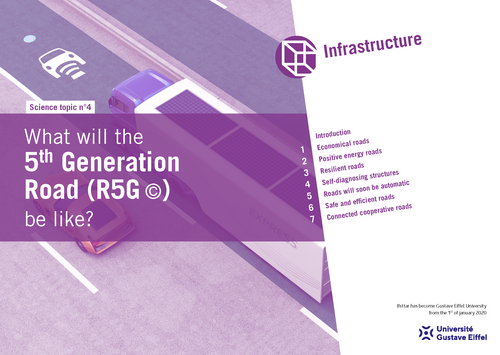What will the 5th Generation Road (R5G©) be like ?
Nicolas Hautière, scientific coordinator of the science topic, Gustave Eiffel University
Road network managers must satisfy users’ demand for unrestricted travel on a safe road network that is equipped with an increasing number of services. To achieve this, roads must be maintained without disrupting traffic and be able to withstand violent climatic events.
They also need to meet societal demand for a reduction in pollution and adverse environmental impacts. The latter are directly linked to road transport and the increase in transport supply. Nevertheless, in a context of strong budgetary constraints, the road managers in question are finding it increasingly difficult to carry out essential maintenance work and obtain the teams they need for good network operation.
To take up these major challenges
Gustave Eiffel University has launched the 5th Generation Road (R5G©), which has close ties with the European Forever Open Road programme set up and managed by the FEHRL.
The aim of the project is to propose solutions that have the potential for large-scale deploy-ment: communication and energy exchange between the infrastructure, the vehicle and the network manager; recyclable materials with the potential for self-diagnosis and repair, a pave-ment surface that remains permanently optimal irrespective of climatic variations, etc.
The approach involves combining the com-ponents of innovative solutions in full-scale demonstrators in order to evaluate the synergies between them and propose comprehensive solutions that are appropriate for deployment on a larger scale.
A three-pronged approach
To foster the implementation of ground-breaking technologies in the area of transport infrastructure, R5G© will adopt a three-pronged approach.
- Component testing consists of identifying, testing and approving the largest possible number of innovative solutions under controlled conditions.
- Acceptability testing consists of combining a sub-set of these innovations within what will be known as “R5G©” demonstrators that will be installed directly on the road network. The goal is to evaluate synergy between the technical solutions and identify problems that may be encountered when implementing combinations of them. With these thematic demonstrators it will also be possible to study their acceptability and their impact of user behaviours.
- The innovative road consists of designing public policy instru-ments which allow the nationwide implementation of the innovative combination tested in R5G©.
Read the full science topic in PDF format
The R5G project aims to accelerate the deployment of innovations, imagined or available in laboratories, through the development of large-scale research demonstrators.

Credit Epictura
Summary
Introduction
Making roads that are more sustainable, with lower emissions and that use fewer natural resources
Giving priority to positive energy roads
Improving the resilience of roads to climatic events and natural hazards
Encouraging the self-diagnosis of structures
Encouraging cooperative and innovative traffic management
Designing safer and more efficient infrastructure
- By Joël Yerpez
Connected cooperative roads as a response
Identity card of the science topic
| Title: | What will the 5th Generation Road (R5G©) be like ? |
| Coordinator: | Nicolas Hautière |
| Authors: | Nicolas Hautière, Agnès Julien, Emmanuel Chailleux, Paul Marsac, Philippe Tamagny, Yasmina Boussafir, Frédéric Bourquin, Christophe Desnouailles, Joël Yerpez |
| Collection: | Ifsttar sciences topics |
| Version: | PDF for free download in web and print versions |
| Licence: | Creative Common CC BY-SA 4.0 |
| Publication: | February 2014 |
| Languages: | French and english |
| Keywords: | Innovations, connected road, resilience, road network, sustainability, energy, Ifsttar science topics |

![[Translate to English:] Licence Creative Common CC BY-SA 4.0 [Translate to English:] Licence Creative Common CC BY-SA 4.0](https://reflexscience.univ-gustave-eiffel.fr/fileadmin/ReflexScience/Accueil/Logos/CCbySA.png)